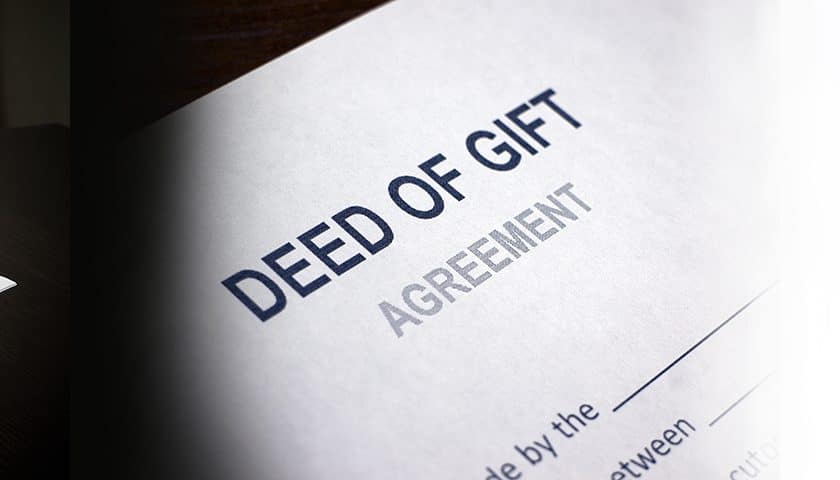By Heena Thalesar, Advocate
heenathalesar2233@gmail.com | February 2, 2023
There is a lot of confusion amongst lawyers and public in general “whether one can gift an immovable property reserving life interest for himself/herself?”
Many people would like to gift their residential premises to their children during their life time to avoid future unpleasantness amongst family members, however, at the same time they wish to safeguard themselves by retaining their life interest and the possession of the residential premises during the time they are alive.
Chapter VII of the Transfer of Property Act, 1882 (“the Act”) (Sections 122 to 129) deals with gifts generally and interalia provides for the mode of making gifts, which are as under:
(i) Section 122 of the Act defines “gift” as a transfer of certain existing movable or immovable property made voluntarily and without consideration by one person called the Donor to another called the Donee and accepted by or on behalf of the Donee.
(ii) Section 123 of the Act regulates the mode of making a gift and inter alia, provides that a gift of immovable property must be effected by (a) a registered instrument signed by or on behalf of the Donor and (b) attested by at least two witnesses. In the case of movable property, transfer either by a registered instrument signed as aforesaid or by delivery is valid.
(iii) Sections 124 to 129 deals with gifts of existing and future property, gift made to several persons of whom one does not accept, suspension and revocation of a gift, and onerous gifts including effect of non-acceptance by the Donee of any obligation arising thereunder.
The Hon’ble Supreme Court in Naramadaben Maganlal Thakker v. Pranjivandas Maganlal Thakker and Ors (MANU/SC/1045/1997: (1997) 2 SCC 255), inter alia, held that the execution of a registered gift deed and acceptance of the gift with delivery of the property together makes the gift complete. Thereafter, the Donor is divested of his title and the Donee becomes the absolute owner of the property. It was observed and held that since the Donor had executed a conditional gift deed and retained the possession and enjoyment of the property during lifetime, the Gift had become ineffective.
The Hon’ble Supreme Court in its another decision in K. Balakrishnan v. K. Kamalam and Ors. MANU/SC/1071/2003: (2004) 1 SCC 581 after recording the reasons inter alia held that “The High Court was, therefore, apparently wrong in coming to the conclusion that the gift-deed was ineffectual merely because the Donor had reserved to herself the possession and enjoyment of the property gifted.” However, Judgment of Narmadaben Maganlal Thakker was not discussed in this case.
In view of the apparent conflict between two above referred decisions, the above issues were referred to the larger bench in the matter of (Renikuntle Rajamma V/s. K. Sarwanamma – reported in AIR 2014 SC 2906) before the Hon’ble Supreme Court of India. While deciding the reference, the Hon’ble Supreme Court inter alia, observed and held that:-
(i) Careful reading of Section 123 of the Act which leaves no manner of doubt that a gift of immovable property can be made by a registered instrument signed by or on behalf of the Donor and attested by at least two witnesses and if the same is accepted by or on behalf of the Donee. A conjoint reading of Sections 122 and 123 of the Act makes it abundantly clear that “transfer of possession” of the property covered by the registered instrument of the gift duly signed by the Donor and attested as required is not a sine qua non for the making of a valid gift under the provisions of Transfer of Property Act, 1882. Judicial pronouncements as to be the true and correct interpretation of Section 123 of the Act have for a fairly long period held that Section 123 of the Act supersedes the rule of Hindu Law (ref: full bench Judgment of the High Court of Allahabad in Lallu Singh v. Gar Narain&Ors – AIR 1922 All. 467) if there was any making of delivery of possession an essential condition for the completion of a valid gift.
(ii) Section 123 of the Act makes transfer by a registered instrument mandatory. This is evident from the use of the words “transfer must be effected” used by the Parliament in so far as immovable property is concerned. In contradiction to that requirement the second part of Section 123 of the Act dealing with gifts of movable property, simply requires that gift of movable property may be effected either by a registered instrument signed as aforesaid or “by delivery”. The difference in the two provisions lies in the fact that in so far as the transfer of movable property by way of gift is concerned the same can be effected by a registered instrument or by delivery. Such transfer in the case of immovable property no doubt requires a registered instrument but the provision does not make delivery of possession of the immovable property gifted as an additional requirement for the gift to be valid and effective. If the intention of the legislature was to make delivery of possession of the property gifted also as a condition precedent for a valid gift, the provision could and indeed would have specifically said so. Absence of any such requirement can only lead us to the conclusion that delivery of possession is not an essential prerequisite for the making of a valid gift in the case of immovable property.
(iii) There is indeed no provision in law that ownership in property cannot be gifted without transfer of possession of such property. As noticed earlier, Section 123 of the Act does not make the delivery of possession of the gifted property essential for validity of a gift.
(iv) What is retained is only the right to use the property during the lifetime of the Donor which does not in any way affect the transfer of ownership in favour of the Donee by the Donor.
The effect of the above Judgment of the Hon’ble Supreme Court is that a gift of an immovable property merely on the ground that the Donor has reserved a life interest (or possession) cannot vitiate the gift provided other requirements of Section 123 of the Act are met with.
ADDITIONAL OVERRIDING PROVISIONS FOR SENIOR CITIZENS
The Maintenance and Welfare of Parents and Senior Citizens Act, 2007 (“2007 Act”) provides for effective provisions for Maintenance and Welfare of Parents and Senior citizens.
Section 3 of 2007 Act has overriding effect. It says that 2007 Act shall have effect notwithstanding anything inconsistent therewith contained in any enactment other than 2007 Act or in any instrument having effect by virtue of any enactment other than 2007 Act.
Section 23 of 2007 Act provides that where any senior citizen who, after the commencement of 2007 Act has transferred by way of gift or otherwise his property subject to the condition that the transferee (Donee) shall provide the basic amenities and basic physical needs to the transferor (Donor) and such transferee refuses or fails to provide such amenities and physical needs, the said transfer of property shall be deemed to have been done either by fraud or coercion or under undue influence and shall at the option of the transferor (Donor) be declared void by the tribunal.
The effect of the above referred provisions of 2007 Act is as under:-
(a) the senior citizen (who has attained the age of 60 years or above) can, after the commencement of 2007 Act i.e. from 29th December, 2007, gift the immovable property subject to the conditions referred in section 23 of 2007 Act; and
(b) 2007 Act has overriding effect over all other Acts and therefore, such conditions imposed while gifting the immovable property shall be considered as valid.







